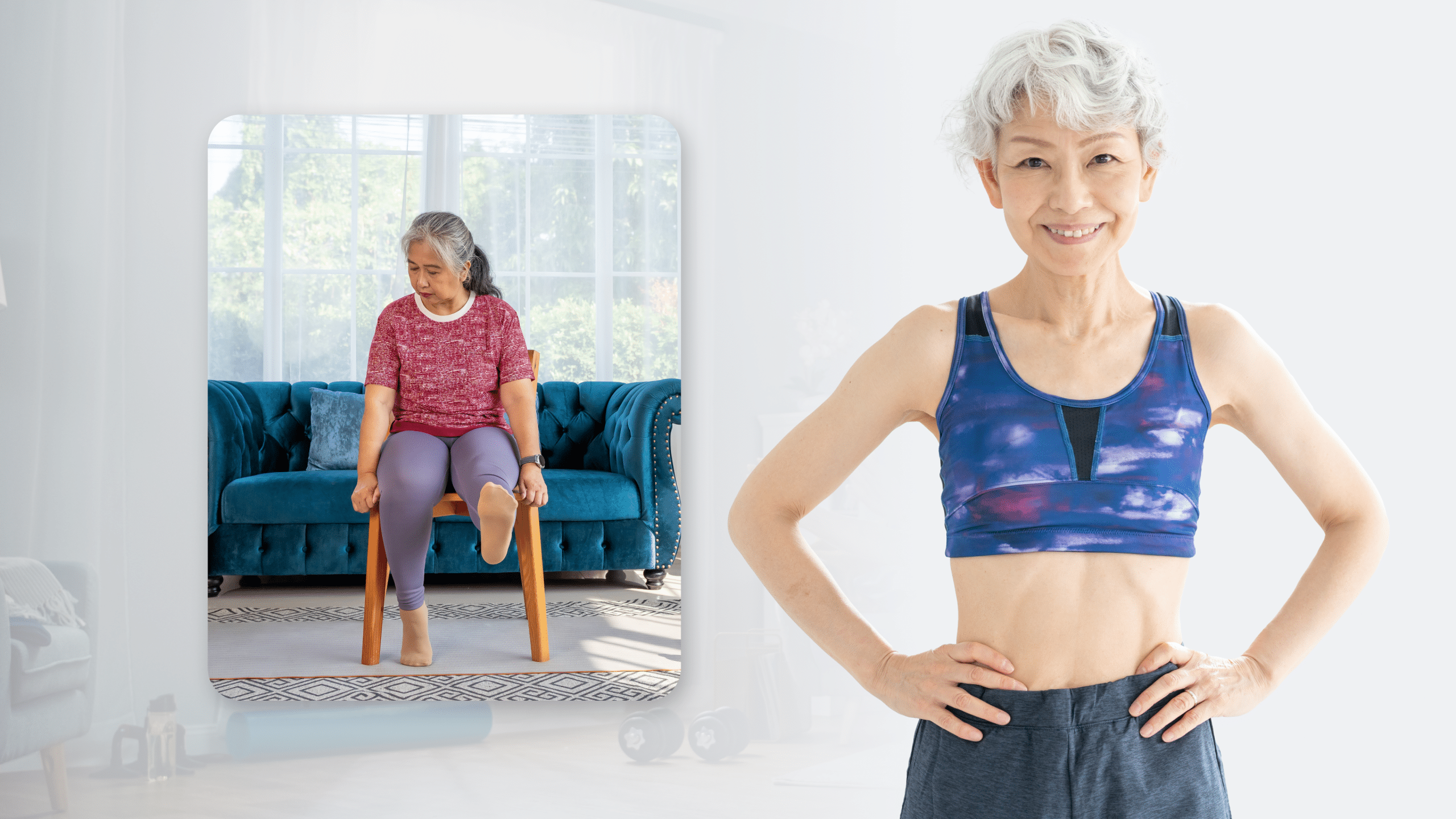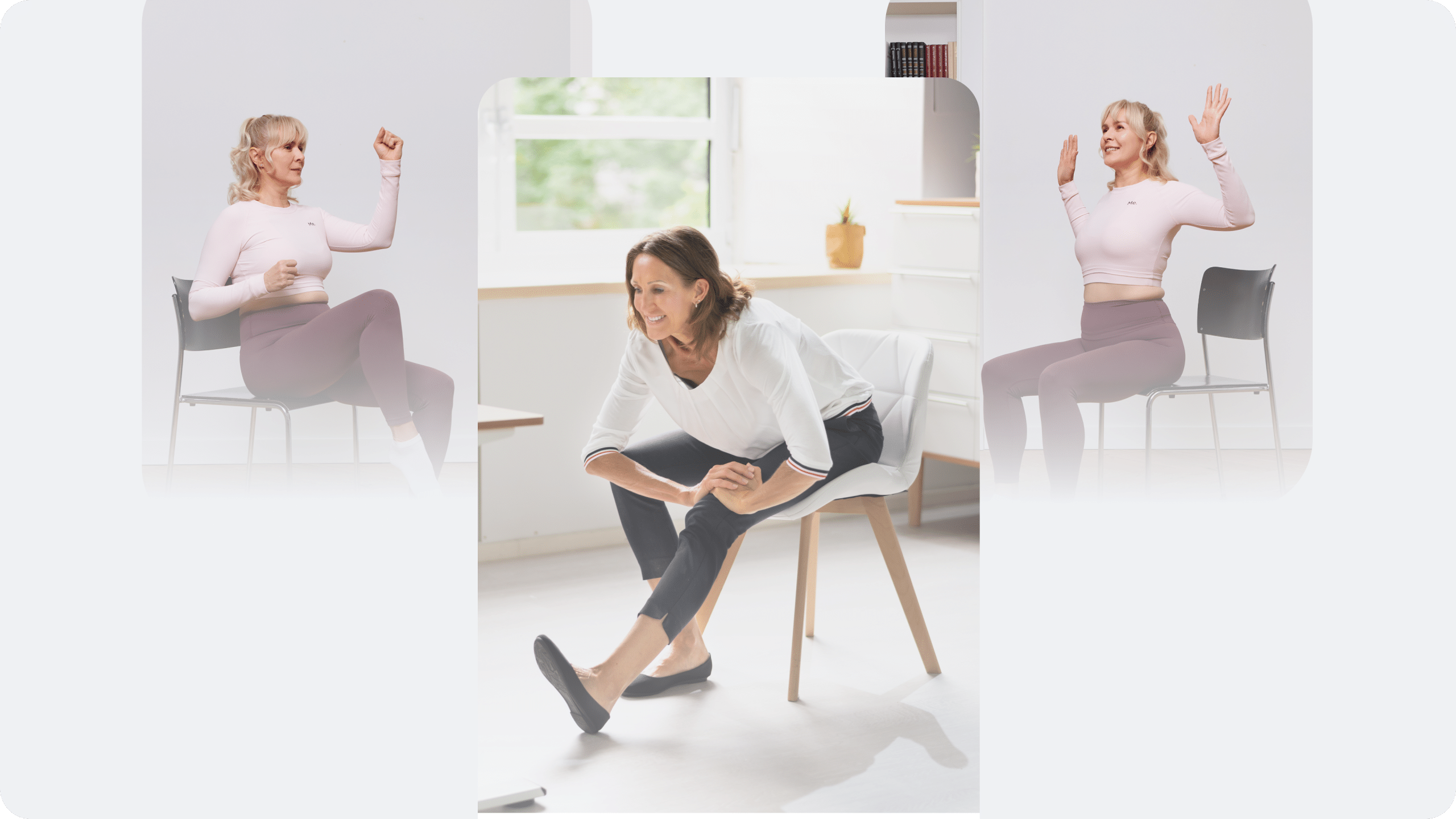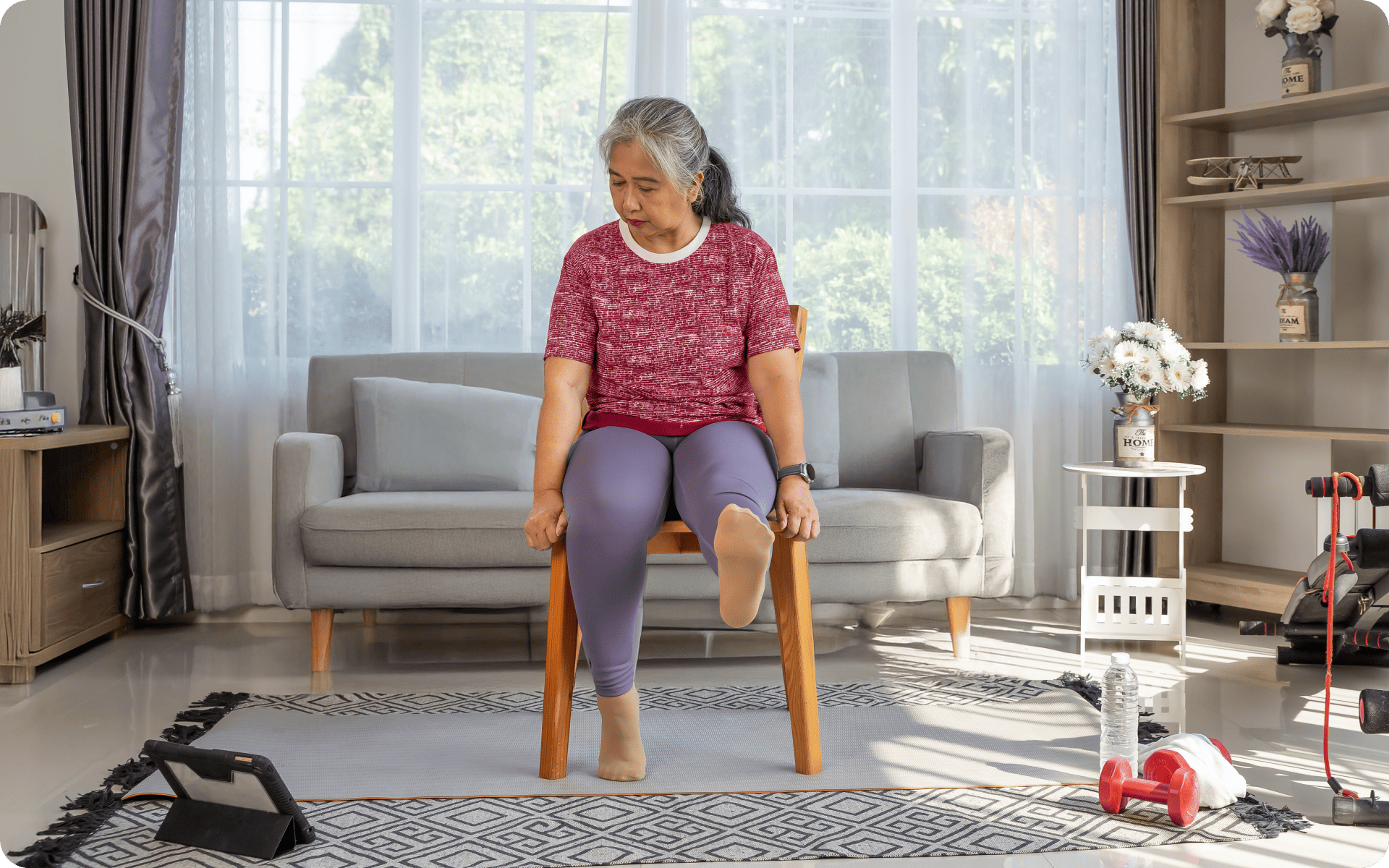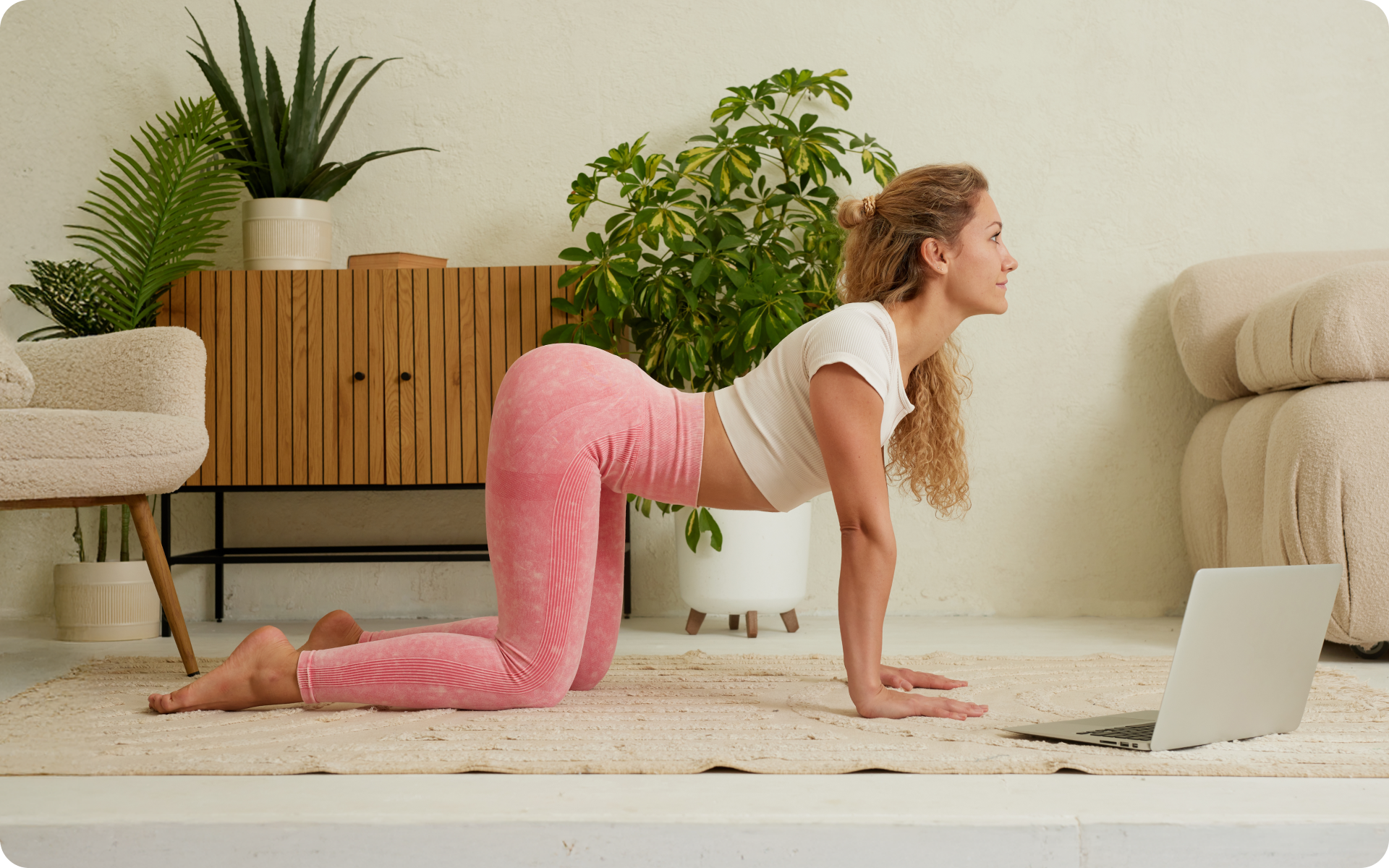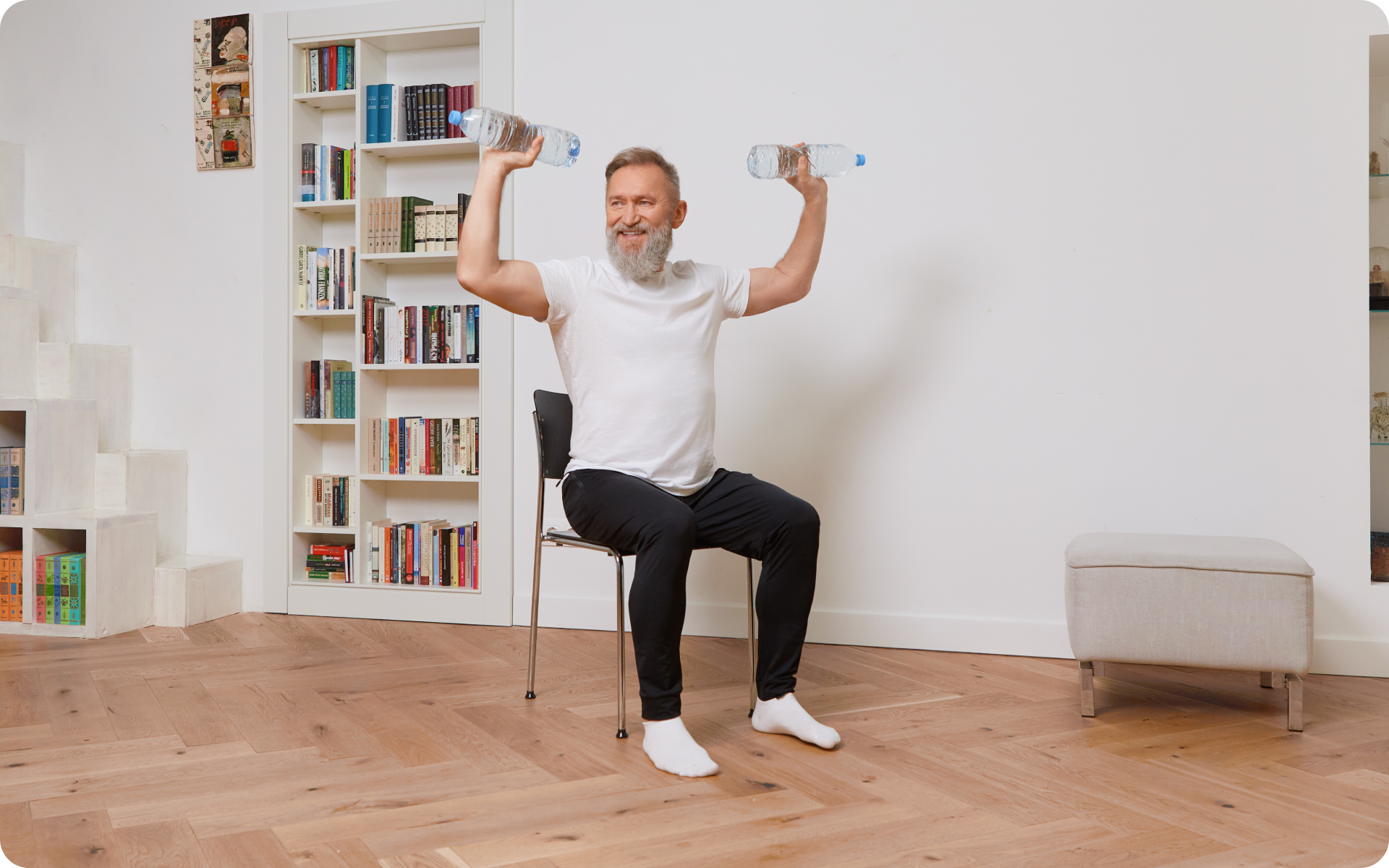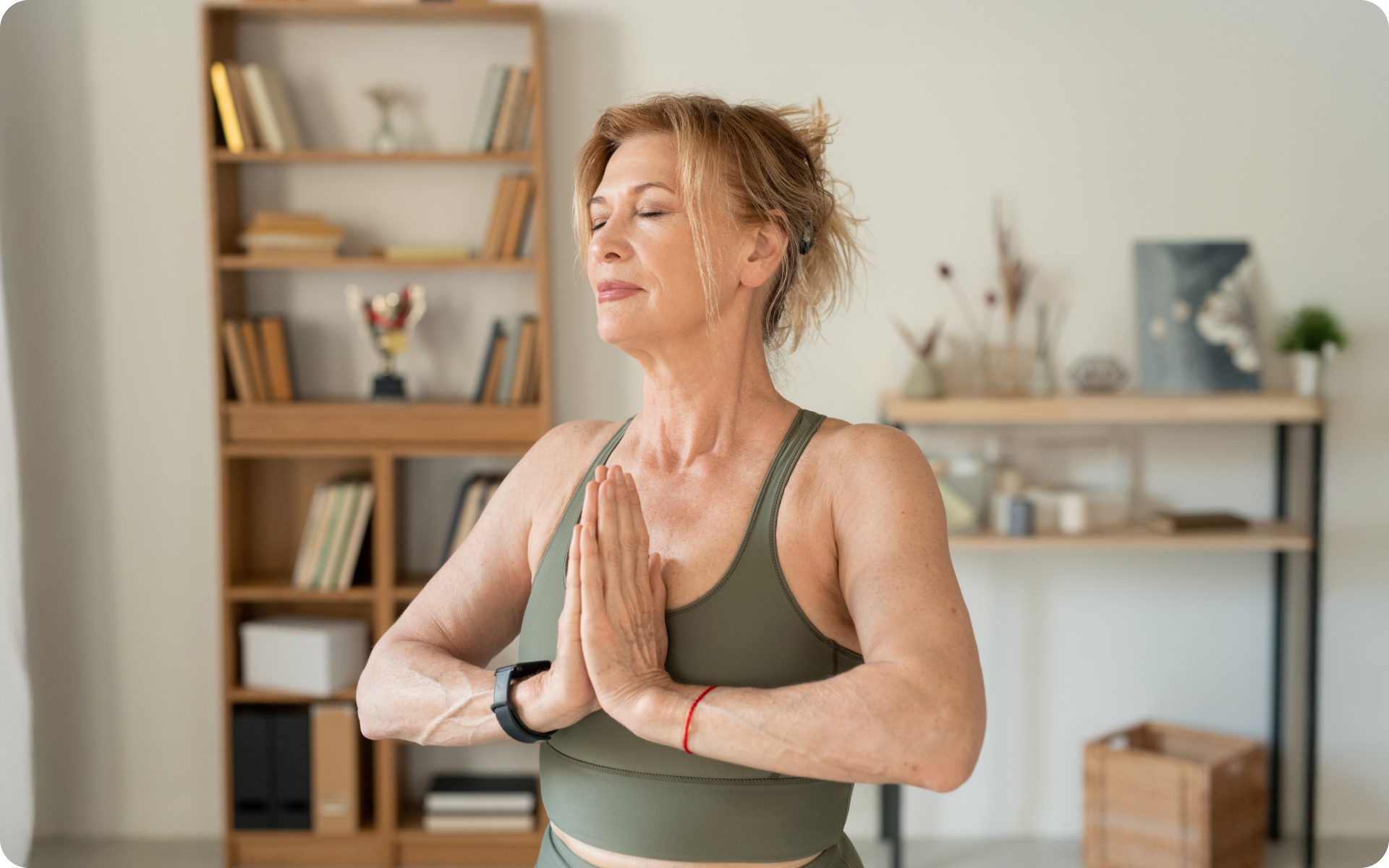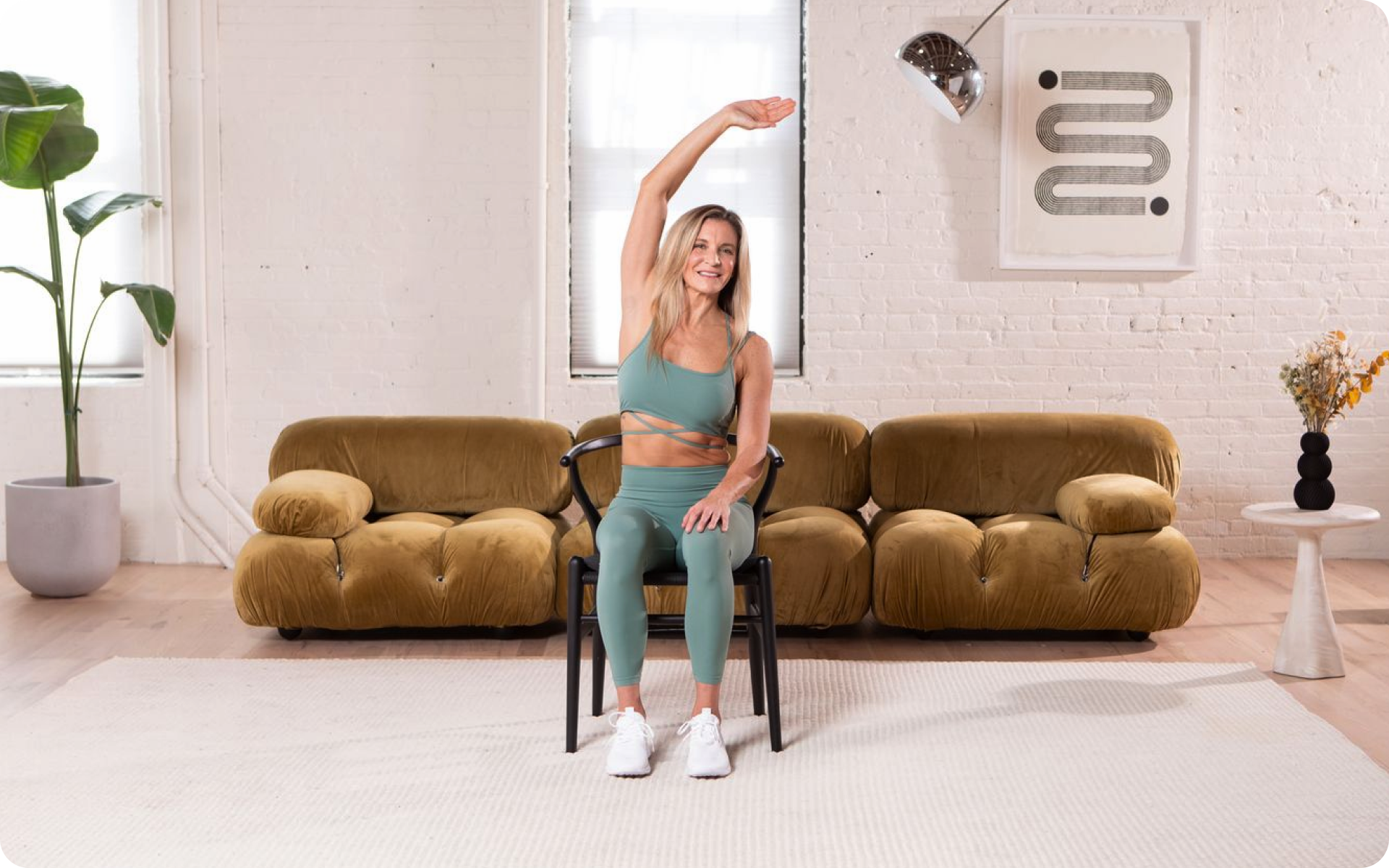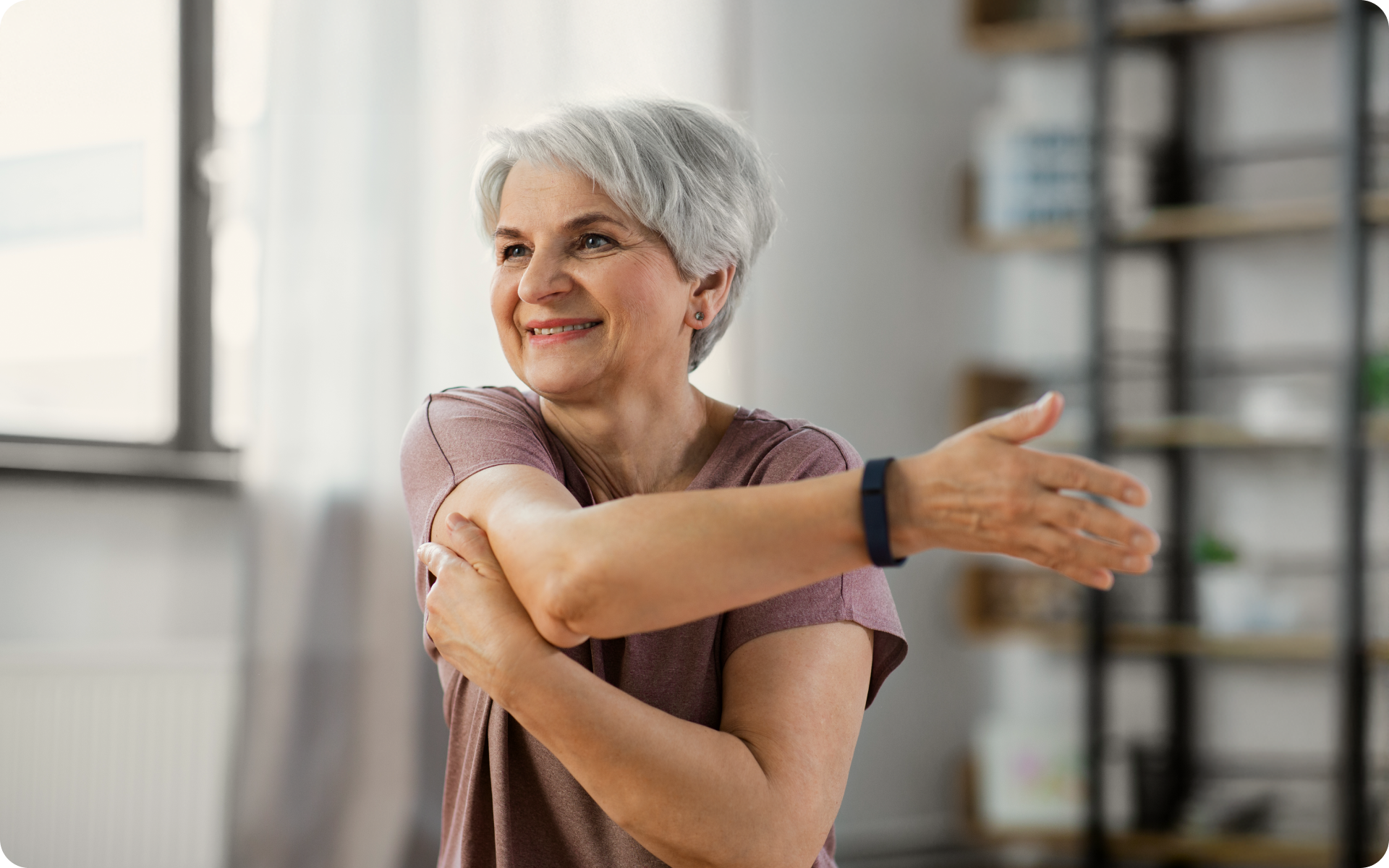The gluteal muscles are one of the largest and most powerful muscle groups in our body (1). They play a crucial role in maintaining good posture, stability, and mobility. Strengthening them translates to better balance, reduced risk of injury, and improved athletic performance.
What happens when you can’t perform the conventional glute strengthening exercises, due to injury, age or mobility issues? Should you miss out on all the benefits of stronger gluteal muscles?
Not at all, especially when chair yoga is an option. Chair yoga is just like a regular yoga routine, but you perform these poses while sitting on a chair or using it for support. It’s gentle on the joints and could be a perfect option for people who may have difficulty getting up and down from the ground.
Here are 6 must-have chair yoga exercises that specifically target and strengthen your glutes:
What Is Chair Yoga for Glutes?
Chair yoga for glutes is a specific type of yoga that focuses on strengthening and stretching the gluteal muscles while utilizing a chair for support. It is designed to be accessible to individuals who may have difficulty performing traditional floor-based exercises due to injury, age, or mobility issues.
This form of yoga not only targets the glute muscles but also engages other muscle groups such as the core, back, and legs. By using a chair for support, it allows individuals to safely perform various poses and movements, without putting too much strain on their joints and muscles.
Chair yoga can be beneficial for people of all ages and fitness levels. Whether you’re recovering from an injury or looking for a low-impact way to strengthen your glutes, chair yoga can be a great option.
To learn more about low-impact workouts, check out our in-depth article on Pilates vs yoga for weight loss.
Is Chair Yoga Good for Glutes?
Chair yoga has numerous benefits for the gluteal muscles. Here are some reasons why you should consider incorporating chair yoga into your fitness routine:
Increased Strength and Stability
Chair yoga for glutes involves a combination of strengthening and stretching exercises that target the glute muscles. These exercises help build strength in your glutes, which can improve your overall stability and balance. Stronger glutes also play a significant role in preventing injuries, especially for older adults (2).
Improved Posture
The glutes are an essential part of our postural muscles and play a key role in maintaining good posture. Weak or inactive glutes can lead to poor posture and muscle imbalances, which can cause pain and discomfort in the back, hips, and knees. Regular chair yoga practice can help activate and strengthen these muscles, leading to improved posture (2).
Read more: 12 Posture Exercises Worth Adding To Your Routine
Better Mobility and Flexibility
Chair yoga for glutes incorporates a variety of movements and stretches, specifically designed to enhance mobility and flexibility in the hips.
This practice can be particularly beneficial for individuals experiencing tight hip flexors or lower back pain, as it promotes proper alignment and encourages relaxation in these areas.
By using a chair as a support, participants can safely engage in poses that target the glute muscles and surrounding regions, making it accessible for those with limited mobility or balance concerns (2).
Low-Impact Exercise Option
For individuals who may have difficulty performing high-impact exercises due to injury or joint issues, chair yoga can be a safe and effective alternative. The use of a chair for support reduces the risk of strain or injury, making it accessible to people of all ages and fitness levels (2).
Read more: Pilates Vs Yoga For Weight Loss: The Battle Of Low-Impact Exercises
How to Grow Your Glutes While Sitting?
Growing stronger glutes from the comfort of your chair involves incorporating specific exercises that target these muscles.
Consistently performing these exercises will not only help you build strength but also improve your overall posture and reduce the risk of injury, all while you go about your daily tasks.
In our opinion, these are 6 must-have chair yoga exercises for stronger glutes:
Seated Pigeon Pose
The Seated Pigeon Pose is an effective stretch that targets the gluteal muscles, particularly the piriformis. By crossing one ankle over the opposite knee and leaning forward, you deepen the stretch in your hip area, promoting flexibility and strength in the glutes.
This pose not only helps relieve tension but can also enhance overall mobility, making it a great addition to your routine.
Steps
- Sit on the edge of your chair with your feet flat on the floor.
- Cross your right ankle over your left knee, forming a figure four.
- Flex your right foot to protect your knee.
- Gently lean forward, keeping your back straight, until you feel a stretch in your right hip.
- Hold the position for 20-30 seconds, breathing deeply.
- Slowly return to the starting position and repeat on the other side.
Seated Leg Extension
The Seated Leg Extension is a fantastic exercise for strengthening the quadriceps muscles, along with your glutes. By extending your leg while maintaining proper posture, you engage your glutes effectively. Although your quadriceps muscles will be the primary muscles targeted in this exercise, it is still a great option for improving overall glute strength.
This movement not only builds strength but also improves stability and control in your lower body, which is essential for overall fitness.
Steps
- Sit up straight in your chair with your feet flat on the ground.
- Extend your right leg straight out in front of you, keeping it parallel to the floor.
- Flex your foot and engage your quadriceps and glutes.
- Hold for a few seconds, then lower your leg back to the ground.
- Repeat this movement 10-15 times on each leg while maintaining proper posture.
- Focus on squeezing your glutes with each extension to maximize effectiveness.
Seated Forward Fold
The Seated Forward Fold is an excellent pose for stretching the lower back and improving hip flexibility, while also engaging the glutes.
This pose helps to lengthen the spine and relieve tension in the lower body, making it beneficial for those who spend long periods sitting. It promotes relaxation, improves circulation, and aids in strengthening the glute muscles when performed correctly.
Steps
- Sit on the edge of your chair with your legs extended straight in front of you, feet hip-width apart.
- Inhale deeply, raising your arms overhead to lengthen your spine.
- Exhale as you hinge at your hips, reaching forward towards your feet while keeping your back straight.
- Hold the position for 20-30 seconds, breathing deeply and feeling the stretch in your hamstrings and glutes.
- Slowly return to the starting position and repeat as needed.
Chair Bridge Pose
The Chair Bridge Pose is a fantastic exercise for strengthening the glutes, while also engaging the hamstrings and lower back. This exercise can improve posture and stability, as well as increase core strength.
Steps
- Sit at the edge of your chair with your feet flat on the floor, hip-width apart.
- Lean slightly back, placing your hands on the sides of the chair for support.
- Press your feet firmly into the ground and engage your glutes.
- Lift your hips off the chair, creating a straight line from your knees to your shoulders.
- Hold for 5-10 seconds, then lower back down with control.
- Repeat 8-12 times, maintaining focus on the use of your glutes throughout the movement.
Chair Crescent Lunge
The Chair Crescent Lunge is another powerful exercise aimed at activating the glutes, while also working on balance and stability.
This pose mimics a traditional lunge but is adapted for those using a chair for support, providing a safer way to strengthen the lower body and improve overall core engagement.
Steps
- Sit at the edge of your chair with your feet flat on the floor.
- Stand up, placing your left foot slightly back while keeping your right foot firmly planted in front.
- Bend your right knee into a lunge position as you lower your hips, making sure your knee doesn’t extend past your toes.
- Keep your back straight and engage your glutes while pushing through your right heel.
- Hold the position for 5-10 seconds, then return to a standing position.
- Repeat 8-10 times on each side, focusing on form and control throughout the movement.
Chair Donkey Kicks
Chair Donkey Kicks are an excellent way to specifically target the glute muscles, particularly the gluteus maximus, while also enhancing hip stability.
This exercise can be performed while seated, allowing for a low-impact movement that promotes strength without compromising balance.
Steps
- Sit towards the edge of your chair with your feet flat on the floor.
- Lean slightly forward, engaging your core and maintaining a straight back.
- Extend your right leg back behind you, keeping your foot flexed.
- Squeeze your glutes as you lift your leg towards the ceiling without arching your back.
- Lower your leg back down, returning to the starting position.
- Complete 10-15 repetitions on each leg, focusing on controlled movement and engaging the glutes with each kick.
Adding these exercises into your routine ensures a targeted approach to glute strengthening while seated, enabling you to enhance flexibility, mobility, and overall fitness, all from the comfort of your chair.
How Many Times a Week Should You Do Chair Yoga to Grow Glutes?
Experts recommend adding glute-strengthening exercises into your routine 2-3 times a week for optimal results. According to the World Health Organization (WHO), engaging in strength training on 2 or more days a week is important for overall health and fitness. (3).
This principle also extends to chair yoga exercises designed to strengthen the glutes. By allowing for adequate rest and recovery, you can prevent overuse injuries while promoting muscle growth.
It is important to listen to your body and adjust your routine accordingly. If you experience any discomfort or soreness, take a day off to rest before resuming your exercises. Additionally, consulting with a certified fitness professional can help create a personalized plan tailored to your specific needs and goals.
How Long Does It Take to See Results with Chair Yoga?
It may take anywhere from 4-8 weeks to see visible results when incorporating chair yoga exercises into your routine (4). Everyone’s body responds differently, and various factors such as age, genetics, nutritional intake, and overall fitness level can impact the rate of progress.
For example, those who are new to fitness and have a sedentary lifestyle may see results more quickly, compared to someone who is already physically active. Consistency, proper form, and challenging yourself with incremental progress will also play a vital role in achieving your desired results.
The changes from chair yoga will happen gradually, and here’s what you can expect:
Weeks 1-2: Foundation Building
- Focus: Begin to familiarize yourself with chair yoga poses specifically targeting the glutes.
- Activities: Aim for 2-3 sessions per week. Each session should last about 20-30 minutes, incorporating basic poses like the Seated Forward Fold and Chair Bridge Pose.
- Expected Results: You may notice increased flexibility and muscle activation in the glutes. Improved posture may also start to manifest.
Weeks 3-4: Strengthening Phase
- Focus: Intensify your routine by including more challenging poses such as Chair Crescent Lunge and Chair Donkey Kicks.
- Activities: Continue with 2-3 sessions per week, gradually increasing repetitions and hold times for each exercise to build strength.
- Expected Results: Greater muscle endurance and a slight increase in glute definition may be apparent. You might also experience enhanced stability and balance.
Weeks 5-6: Progress Evaluation
- Focus: Assess your progress and adjust your routine as needed to maintain motivation and challenge.
- Activities: Integrate a mix of previously mastered exercises with new variations. Maintain the frequency of 2-3 sessions per week while potentially increasing the duration to 30-40 minutes.
- Expected Results: Noticeable improvements in glute strength and size, along with a more sculpted appearance. You may find daily activities easier, as your overall functional strength improves.
Weeks 7-8: Transformational Results
- Focus: Consolidate gains while continuing to challenge yourself with advanced variations or increased weights where applicable.
- Activities: Keep up with regular sessions, focusing on perfecting your form and exploring additional movements to prevent plateaus.
- Expected Results: By the end of week 8, you should see significant changes in glute strength and shape. Increased overall body confidence may accompany these physical transformations, promoting a positive outlook on your fitness journey.
Remember these changes take time, effort and consistency. Stay dedicated to your chair yoga practice, and you’ll be on your way to stronger, healthier glutes.
FAQs
Does Sitting Deactivate Glutes?
Sitting for long periods can deactivate your glutes. When you sit, especially in a slouched position, the muscles can become inactive, leading to a weakening over time. This is often referred to as “gluteal amnesia,” and it can make it harder to engage these muscles during other activities (5).
What Are the Symptoms of Weak Glutes?
Weak glutes can manifest in several ways. Common symptoms include lower back pain, hip discomfort, or even knee issues (5). You might also notice difficulties with activities that require power, like running or climbing stairs. If you see increased fatigue during workouts, it could be a sign your glutes aren’t firing as they should.
Does the Chair Yoga Plan Really Work?
Absolutely! The Chair Yoga Plan is designed to engage your glutes and improve strength over time. When done consistently—2-3 times a week—you can expect to see enhancement in muscle tone and overall physical function. Many find it an effective and accessible workout routine, especially for those with mobility challenges.
Does Squeezing Your Glutes While Sitting Do Anything?
Squeezing your glutes while sitting can help activate those muscles, even in a chair. This is a simple way to incorporate glute engagement into your day. It can also promote better posture and alleviate some pressures on your spine, making it a good habit to form.
Can You Get in Shape with Chair Yoga?
Chair Yoga offers a range of benefits, including flexibility, strength, and balance (1). It might not replace high-intensity workouts for everyone, but it can definitely contribute to an overall fitness plan. Consistent practice helps build endurance and improves mobility, making it easier to stay active.
Is It Okay to Do Chair Yoga Every Day?
Doing Chair Yoga every day can be beneficial, especially if you listen to your body and perform exercises at a lower overall intensity. Many people find daily practice helps with flexibility and muscle recovery. Just be sure to mix in different poses and variations to prevent overuse and keep your routine engaging!
The Bottom Line
Chair yoga is an excellent way to engage the glutes, while making the practice accessible for individuals of all fitness levels. As you incorporate these exercises into your routine, remember that consistency and proper nutrition are the keys to unlocking the benefits.
Beyond just strengthening your glutes, chair yoga can enhance overall mobility, balance, and posture, contributing to a healthier lifestyle. Embrace the journey and listen to your body; every small step you take towards strengthening your glutes over time can lead to larger improvements in your overall well-being.
DISCLAIMER:
This article is intended for general informational purposes only and does not serve to address individual circumstances. It is not a substitute for professional advice or help and should not be relied on for making any kind of decision-making. Any action taken as a direct or indirect result of the information in this article is entirely at your own risk and is your sole responsibility.
BetterMe, its content staff, and its medical advisors accept no responsibility for inaccuracies, errors, misstatements, inconsistencies, or omissions and specifically disclaim any liability, loss or risk, personal, professional or otherwise, which may be incurred as a consequence, directly or indirectly, of the use and/or application of any content.
You should always seek the advice of your physician or other qualified health provider with any questions you may have regarding a medical condition or your specific situation. Never disregard professional medical advice or delay seeking it because of BetterMe content. If you suspect or think you may have a medical emergency, call your doctor.
SOURCES:
- What is the strongest muscle in the human body? (2024,loc.gov)
- Effect of Chair Yoga Therapy on Functional Fitness and Daily Life Activities among Older Female Adults with Knee Osteoarthritis in Taiwan: A Quasi-Experimental Study (2023,nih.gov)
- WHO GUIDELINES ON PHYSICAL ACTIVITY AND SEDENTARY BEHAVIOR (2020,who.int)
- Impact of 10-weeks of yoga practice on flexibility and balance of college athletes (2016,nih.gov)
- ASSESSING AND TREATING GLUTEUS MAXIMUS WEAKNESS – A CLINICAL COMMENTARY (2019,nih.gov)


